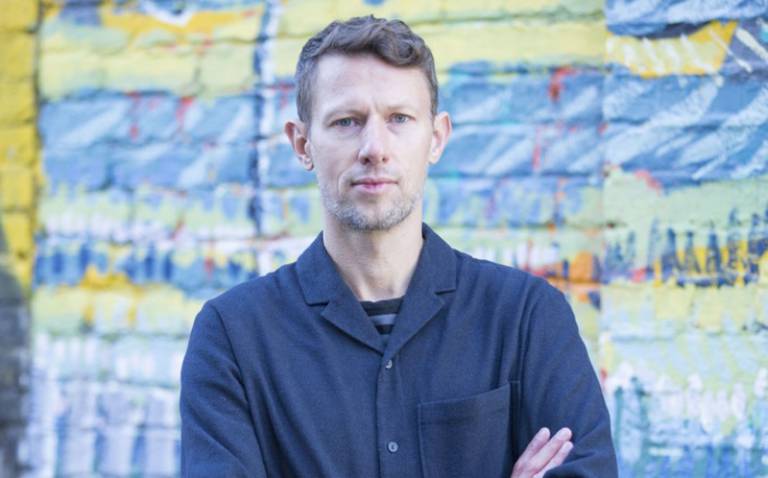Spotlight On... Ben Campkin
31 August 2022
This week, meet Professor Ben Campkin, Professor of Urbanism at The Bartlett School of Architecture, and Academic Lead for UCL East. Read about launches of urban initiatives at UCL East and his previous work for LGBTQ+ spaces. Good academic stock, but still makes room for laughs.

What is your role and what does it involve?
I’m Professor of Urbanism and Urban History in The Bartlett School of Architecture, Co-Director of UCL Urban Laboratory, and an Academic Lead for UCL East. As an urbanist, I’m interested in how cities change, how the past, present and future are imagined and communicated in the process, and how the outcomes benefit or disadvantage specific groups.
How long have you been at UCL and what was your previous role?
I arrived as a nervous undergraduate in 1994 and graduated with a combined degree in Medieval Archaeology and History of Art in 1997. After a stint working in insurance, I quickly returned to academia, working in administrative roles and studying for a masters and PhD. I’ve studied in four departments at UCL and worked in four schools in The Bartlett, Faculty of the Built Environment. When researching my PhD, and in the years afterwards, I taught at various universities including UCL, the University of Brighton and Middlesex University, and was a guest lecturer in the School of Architecture at the University of Cape Town. In 2008, I became a full-time academic in The Bartlett School of Architecture and a Co-Director of the then new UCL Urban Laboratory, which I directed from 2011 to 2018. I’m energised by transformative, transdisciplinary, partnership-based and publicly engaged approaches to research and education. I’ve been lucky to work with inspiring collaborators in various parts of UCL who share these interests: the Urban Lab, The Bartlett, qUCL and UCL East.
What working achievement or initiative are you most proud of?
I’ve been thrilled that the work I’ve led through Urban Lab on LGBTQ+ spaces, in collaboration with our partners, has circulated widely and has been found useful by different audiences. It’s informed the London Plan, the Cultural Infrastructure Plan, local area plans, various campaigns to protect queer venues, more than fifty media features, performances and three exhibitions. The project has evolved in multiple directions over several years, and has provided opportunities to collaborate with amazing emerging scholar-activists like Dr Lo Marshall and Dr Alessio Koliulis. This project was an emergency response to a spate of closures of LGBTQ+ venues in the mid-2010s. It was sparked by witnessing community meetings and protests. I’m about to publish a book which documents the campaigns that ensued around that time and the responses of LGBTQ+ populations and City Hall: Queer Premises: LGBTQ+ Venues in London Since the 1980s (Bloomsbury, forthcoming).
Tell us about a project you are working on now which is top of your to-do list
We are launching UCL’s Urban Room at UCL East and Urban Lab’s new MASc Global Urbanism this September, which includes a partnership with the University of Witswatersrand, Johannesburg. These initiatives have had a long gestation. It’s going to be exciting to meet the first cohort, and to see how the programme and the Urban Room will contribute to new ways of thinking about and doing urbanism with our partners.
What is your favourite album, film and novel?
Album: Currently, Ezra Furman’s All of us Flames. Exquisite lyrics, and I can’t wait to see her live in London in the autumn.
Film: Beautiful Thing. One of my few remaining VHS tapes. It sits above my desk. A funny, moving, queer coming of age romance set in Thamesmead during a hot summer in the late 1990s, which unfolds to the dulcet tones of Mama Cass. This was my generation’s Heartstopper. I had the pleasure of hosting Beautiful Thing’s writer, Jonathan Harvey, for an Urban Lab Films event in 2012 when we screened the film as an untypically positive, joyful and queer cinematic depiction of a London estate.
Novel: James Baldwin’s, Another Country (1962), for its wonderful rendering of New York City and its nuanced portrayal of emotionally complex relationships.
What is your favourite joke (pre-watershed)?
My attempts to combine nitrous oxide and Oxo cubes have made me a laughing stock.*
*Fresh from the Edinburgh Fringe, by Olaf Falafel.
Who would be your dream dinner guests?
Three UCL alumni who are sadly no longer with us: Derek Jarman, Mary Douglas and Paula Rego. I’ve heard Professor Douglas was a great host of academic soirèes. Imagine the conversations they’d have about all things taboo.
What advice would you give your younger self?
Be queer. I grew up under Section 28, when it was illegal for local authorities to ‘promote’ homosexuality by mentioning, let alone teaching about it, in schools.
What would it surprise people to know about you?
I’m a Boss-level ukulelist.
What is your favourite place?
Aterro do Flamengo Parc in Rio de Janeiro is high on the list. Conceived by the self-trained landscape architect Lota de Macedo Soares (1910–67) it’s a modernist park, constructed on a landfill site in the Guanabara Bay. It’s such a wonderful mix of people and activities – hard to think of a more successful public space.
Further information
Photo credit: UCL Urban Laboratory/Jacob Fairless Nicholson
 Close
Close

